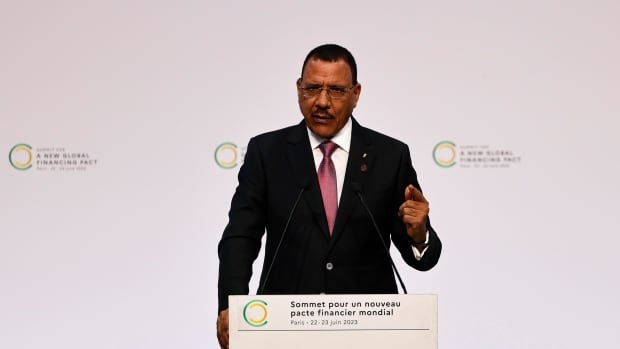Niger’s mutinous soldiers said they will prosecute deposed President Mohamed Bazoum for “high treason” and undermining state security, in an announcement hours after the junta said they were open to dialogue with West African nations to resolve the mounting regional crisis.
If found guilty, Bazoum could face the death penalty, according to Niger’s penal code.
Spokesman Col. Maj. Amadou Abdramane said on state television Sunday night that the military regime had “gathered the necessary evidence to prosecute before competent national and international authorities the ousted president and his local and foreign accomplices for high treason and for undermining the internal and external security of Niger.”
The announcement said high-ranking West African politicians and “their international mentors” have made false allegations and attempted to derail a peaceful solution to the crisis in order to justify a military intervention. The statement did not identify specific Western countries and did not specify a date for the trial.
Bazoum, Niger’s democratically elected president, was ousted by members of his presidential guard on July 26 and has since been under house arrest with his wife and son in the presidential compound in the capital, Niamey. Foreign officials including U.S. Secretary of State Antony Blinken have been able to speak to Bazoum, it has been reported.
West African leaders say military action is not off the table in trying to bring Niger’s president, Mohamed Bazoum, back to power. But coup leaders are defiant while support for the coup remains high in the capital.
Deadline to free president has long passed
People close to the president as well as those in his ruling party say the family’s electricity and water have been cut off and they’re running out of food. The junta, which calls itself the National Council for the Safeguard of the Homeland (CNSP), dismissed these reports Sunday night and accused West African politicians and international partners of fuelling a disinformation campaign.
Immediately after the coup, the West African regional bloc ECOWAS gave the junta seven days to return Bazoum to power and threatened military force if it did not happen, but that deadline came and went with no action from either side.
Last week, ECOWAS ordered the deployment of a “standby” force, but it’s still unclear when or if it would enter the country. The African Union’s Peace and Security Council is meeting on Monday to discuss Niger’s crisis.
On Sunday evening, before the military accused Bazoum of treason, a member of the junta’s communication team told journalists that the regime had approved talks with ECOWAS, which would take place in the coming days. That same day, a mediation team of Islamic scholars from neighbouring Nigeria who had met with the junta on the weekend, said the regime was open to dialogue with ECOWAS.
Previous attempts by ECOWAS to speak with the junta have foundered.
“Let’s see what these negotiations actually look like, because it’s also in the junta’s benefit to in the least entertain talks. That doesn’t mean they’ll be serious about them,” said Aneliese Bernard, a former U.S. State Department official who specialized in African affairs and is now director of Strategic Stabilization Advisors, a risk advisory group.
Jihadi groups take advantage
In the weeks since the coup, the junta has entrenched itself in power, appointing a new government and leveraging anti-French sentiment against its former colonial ruler to shore up support among the population, creating a tense environment for locals who oppose the junta as well as many foreigners and journalists in the impoverished country of about 25 million.
Niger was seen by Western nations as one of the last democratic countries in the Sahel region it could partner with to beat back growing jihadi violence linked to al-Qaeda and the Islamic State group. France and the United States and other European countries have poured hundreds of millions of dollars into propping up Niger’s military. Since the coup, France and the United States have suspended military operations.

Since the coup, jihadi violence has occurred. In the latest incident Sunday, Nigerien security forces were ambushed by fighters believed to be with the Islamic State group who attacked them on a dozen motorcycles, according to a security report for aid groups seen by the Associated Press.
“This is due to the halting of co-operation and the military being busy with consolidating their coup in Niamey,” said Wassim Nasr, a journalist and senior research fellow at the Soufan Center. It’s also a result of cutting communication and dialogue attempts with some jihadi groups, which had been established under Bazoum, he said.
A former jihadi, Boubacar Moussa, told the Associated Press that since the coup he’s received multiple phone calls from active jihadis saying they have been celebrating the chaos and greater freedom of movement.


